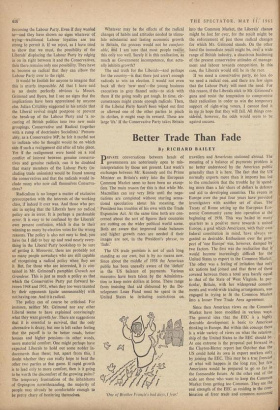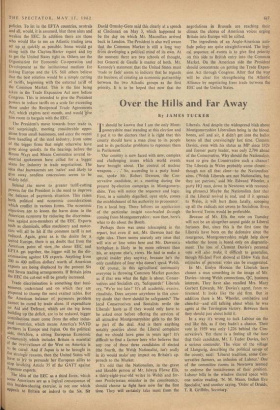Better Trade Than Fade
By RICHARD BAILEY pRIVATE conversations between heads of governments are notoriously open to mis- interpretation by those not present. Last week's exchanges between Mr. Kennedy and the Prime Minister on Britain's entry into the European Common Market seem to have been no excep- tion. The main reason for this is that while Mr. Macmillan can say very little until the nego- tiations are completed without starting sensa- tional speculation about his meaning, the President has troubles of his own with the Trade Expansion Act. At the same time both are con- cerned about the sort of figures their countries are cutting on the wider political world scene. Both are aware that improved trade balances and higher growth rates are needed if their images are not, in the President's phrase, to 'fade.'
The US trade problem is not of such long standing as our own, but is by no means new. Since about the middle of 1958 the American public has been uneasily aware of the 'deficit' in the US balance of payments. Various measures have been taken by the Administra- tion to keep more dollars at home. These range from insisting that aid disbursed by the De- velopment Loan Fund must be spent in the United States to irritating restrictions on 'One of Brother Francis's bad days, 1 fear.'
travellers and Americans stationed abroad. The meaning of a balance of payments problem is no better understood by the American public generally than it is here. The fact that the US normally exports more than it imports has led to the conclusion that the trouble lay in spend- ing more than a fair share of dollars in defence and aid to developing countries. The events in Europe over the past four years have provided' investigators with another set of clues. The Treaty of Rome setting up the European Eco- nomic Community came into operation at the, beginning of 1958. This was hailed in many' quarters as a positive move towards a united Europe, a goal which Americans, with their own ' federal constitution in mind, have always re- garded as desirable. Enthusiasm over the pros- pect of 'one Europe' was, however, damped by two factors. The first was the realisation that its would become increasingly difficult for the United States to export to the Common Market.' The other was a feeling of irritation that only six nations had joined and that three of these covered between them a total area barely equal to that of the State of West Virginia. In par- ticular, Britain, with her widespread commit- ments and world-wide trading arrangements, was engaged in trying to fit the Common Market into a looser Free Trade Area agreement.
Since then American views on the Common Market have been modified in various ways. The general idea that the EEC is a highly desirable development is basic to American thinking in Europe. But within this concept there is a wide variety of views on what the relation- ship of the United States to the EEC should be. At one extreme is the proposal put forward in the Clayton-Herter report last October that the US could hold its own in export markets only , by joining the EEC. This may be a true forecast of what will happen in the long run, but few Americans would be prepared to go so far in the foreseeable future. At the other end of the scale are those who want to keep the Common Market from getting too Common. They see the real strength of the EEC as residing in the com- bination of freer trade and common economic policies. To let in the EFTA countries, neutrals and all, would, it is assumed, blur these aims and weaken the EEC. In addition there are those who would like to see an Atlantic trading area set up as quickly as possible. Some would go along with the Clayton-Herter report and try to get the United States right in. Others see the Organisation for Economic Co-operation and Development as the institutional medium for linking Europe and the US. Still others believe that the best solution would be a simple cutting of tariffs, beginning with the external tariff of the Common Market. This is the line being taken in the Trade Expansion Act now before Congress. This is intended to give the President powers to reduce tariffs on a scale far exceeding those under the Reciprocal Trade Agreements Act, which expires next month, and would "'give him room to bargain with the EEC.
The President's move towards freer trade is, not surprisingly, meeting considerable oppo- sition from small businesses, and since the recent firm handling of the steel industry, from some 01 the bigger firms that might otherwise have gone along quietly. In the hearings before the House Ways and Means Committee several in- dustrial spokesmen have called for a bigger share for industry in trade negotiations. The idea that bureaucrats are 'naive' and likely to give away needless concessions seems to be widely held.
Behind the move to greater tariff-cutting Powers for the President is the need to improve the balance of payments situation. This raises both political and economic considerations which conflict in various forms. The economic objectives are to lessen the harm done to the American economy by reducing the discrimina- tion against non-members of the EEC. Exports such as chemicals, office machinery and motor- cars will all be hit if the common tariff is not reduced. Again, great as is the desire for a united Europe, there is no doubt that from the American point of view the closer EEC and EFTA get together, the bigger will be the dis- crimination against US exports. Anything from 200 to 400 million dollars' worth of American exports are being displaced by the present Six and Seven trading arrangements. If Britain joins the EEC the cut-out will be greatly increased.
Trade discrimination is something that busi- nessmen understand and on which they are Prepared to thump the most exalted tables. But the American balance of payments problem cannot be cured by trade alone. If expenditure oe Aid and Defence, which are the big items building up the deficit, are to be reduced, bigger Contributions must come from the other Indus- ';' trial countries, which means America's NATO partners in Europe and Japan. On the political side, therefore, a strong European Economic Community, which includes Britain is essential if the over-reliance of the West on America is to be cured. And if Japan is to be brought in for strategic reasons, then the United States will have to !Try to persuade her European allies to stop invoking Article 35 of the GATT against Japanese exports.
The idea of the EEC as a third force, which some Americans see as a logical consequence of this burden-sharing exercise, is not one which appeals to Britain or indeed to the Six. Sir David Ormsby-Gore said this clearly at a speech at Cincinnati on May 3, which happened to be the day on which Mr. Macmillan arrived back in London. The President is also well aware that the Common Market is still a long way from developing a political mind of its own. At the moment there are two schools of thought, but General de Gaulle is master of both. Mr. Kennedy's statement that the United States must 'trade or fade' seems to indicate that he regards the business of creating an economic partnership between the two Atlantic groups as the first priority. It is to be hoped that now that the negotiations in Brussels are reaching their climax the chorus of American voices urging Britain into Europe will be stilled.
The ingredients of an Anglo-American anti- fade policy are quite straightforward. The logi- cal sequence of events is to give first priority on this side to British entry into the Common Market. On the American side the President should concentrate on getting the Trade Expan- sion Act through Congress. After that the way will be clear for strengthening the Atlantic Alliance by negotiating freer trade between the EEC and the United States.



































 Previous page
Previous page